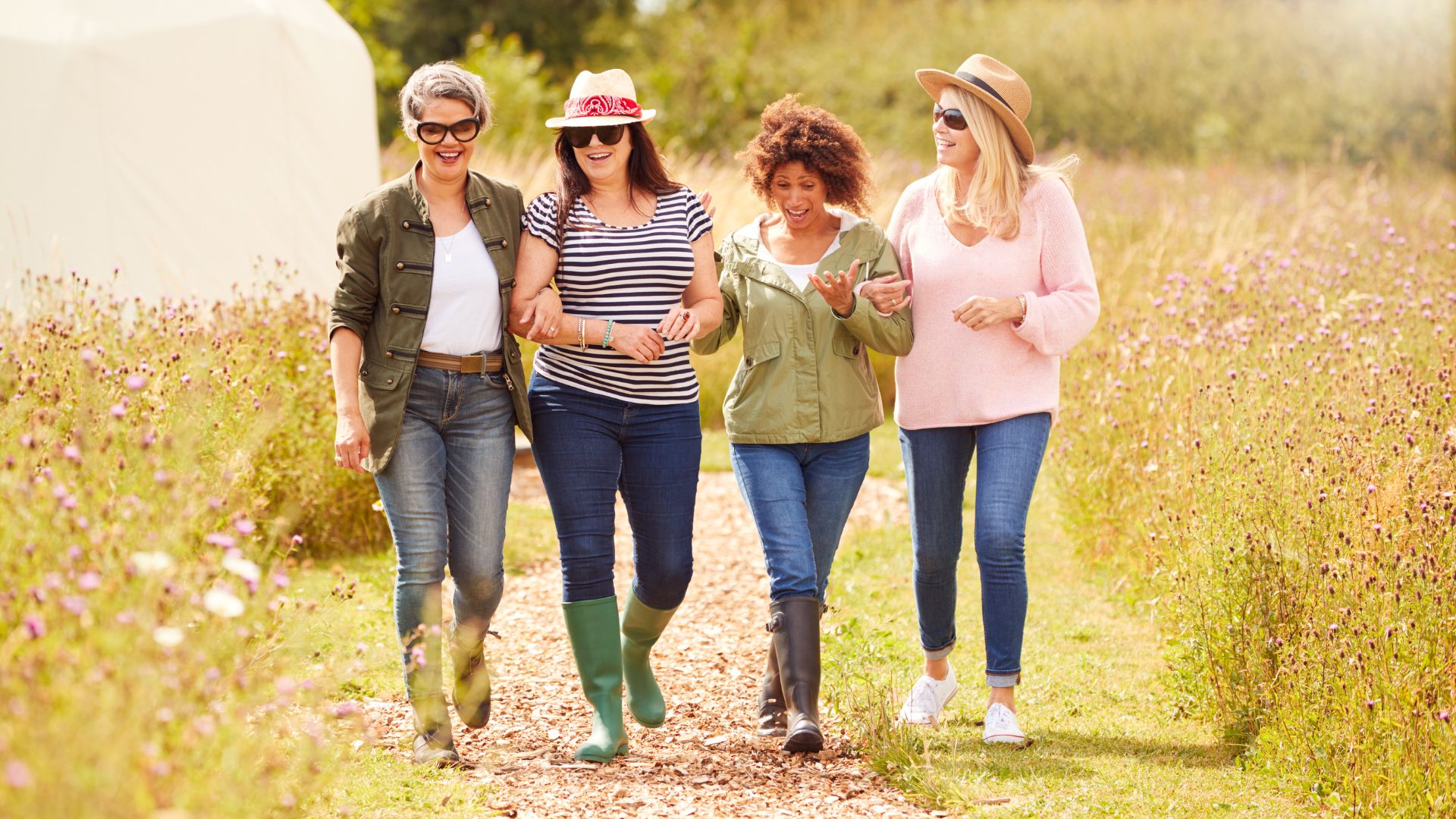I'm in my 40s and feel lonely for the first time - here's what I'm doing to get my spark back
I love what I do, and I love my family. So why am I suddenly feeling so disconnected?


I don't claim to be an expert on how to deal with loneliness. In fact, up until recently, I was someone who loved being in her own company. I was a self-proclaimed introvert who found solitude one of the most rejuvenating things in the world.
Yet, after going through an early menopause and successive bereavements in my family after turning 40, something changed. I was suddenly paying the price of loneliness. I suddenly felt isolated, disconnected from myself, the people I love, and the world, even though my days were full.
“You might be busy, but you might also be quite lonely,” explains Professor Andrea Wigfield, Director of the Centre for Loneliness Studies at Sheffield Hallam University and co-director of the Campaign to End Loneliness. “Sometimes that busyness can sort of mask the loneliness, but then maybe when you’re on your own, you may well feel lonely in those moments where you’re not quite so busy.”
With women in midlife facing increasing societal pressure to be more and do more, it dawned on me that perhaps I wasn't the only one feeling this way, and it turns out I'm not. Not by a long shot. Armed with that information, I set out to uncover why women report feeling lonely in midlife and figure out how to deal with loneliness in my own life.
What is loneliness?
Loneliness isn't just about a lack of companionship. It happens when there's a mismatch between the quality and quantity of the social relationships we have and those we want, according to the UK’s Loneliness Strategy, published in 2018, and based on the work of social psychologists Daniel Perlman and Letitia Anne Peplau.
There's also a difference between temporary and chronic (long-term) loneliness. "Temporary loneliness comes from a life transition point like bereavement, becoming a carer, or moving homes," says Professor Wigfield. "It's easy to get out of in a way because you can do activities like volunteering." This way, you can make new friends as an adult.
If loneliness stays for a long time, though, and you don’t deal with it, it can become chronic. That’s when it kind of changes our psychological perspective. Neuroscience tells us that when we start to perceive people's responses to us in a negative way, we think of ourselves more negatively, too, leading to an increased risk of anxiety and depression.
Sign up to our free daily email for the latest royal and entertainment news, interesting opinion, expert advice on styling and beauty trends, and no-nonsense guides to the health and wellness questions you want answered.
While my feelings of loneliness fall into the temporary category, the fact that I was lonely at all surprised me. Perhaps it’s due to my natural temperament or maybe it’s just sheer luck, but it's never been a feeling I had before turning 40.
Are we lonelier in midlife?
There’s no denying that loneliness is a part of the human condition. Whether temporary or chronic, it’s not a feeling that discriminates, touching us all regardless of age, gender or ethnicity. The BBC's Loneliness Experiment, conducted in 2018, surveyed 38,000 people across the UK and found that levels of loneliness are 14% higher among 35 to 64-year-olds than any other age group.
A more recent study published in The American Psychologist revealed that loneliness in midlife is on the rise, with adults in the United States and England reporting higher levels of loneliness than previous generations.
While my experience certainly matched the statistics, I couldn’t quite put my finger on why I felt lonely in the first place. I would describe myself as very happy in my relationship. I have a fulfilling career, a beautiful step-daughter, great friends, and two adorable cats. Yet, this niggling feeling of being disconnected kept creeping in.
“Midlife can be a difficult time for women as the expectations of how life would be and the reality may look somewhat different,” explains Dr Rachel Davies, a chartered counselling psychologist specialising in relationships. “Psychologically, it can be a difficult period compounded by additional issues such as menopause, teenage children, ageing parents, and busy jobs.”
And that’s when it hit me. It’s not that I want a new life or that I’m unhappy with my choices. It’s just that my current life doesn't quite fit the picture I had in my head. It all feels blurry, like I’m wandering around on autopilot, living the same day repeatedly. Life has somehow become focused on work, household admin, and caring about everyone else. I've lost sight of myself in the process, and I think it's made me feel lonely.
“Work-life balance issues might be a strong [loneliness] factor for women in midlife,” confirms Professor Wigfield. “Perhaps having to care for older parents and younger people, and then trying to balance that with work, and not necessarily having enough time for yourself."
There's "just so many pressures on women of this age group to do everything and be everything," she adds, from carers and parents to partners, friends, and colleagues of others.
I know I put pressure on myself to be a super wife and stepmum. They are two roles that are so important to me, but after speaking to the experts, I couldn't help but feel like I'd perhaps lost myself along the way to fulfilling these titles. I needed to reconnect with myself.

Joining a volunteering or activity group with likeminded women can help with making new friends and combating loneliness.
How to deal with loneliness
When I spoke to Professor Wigfield about how to deal with loneliness, she said the first thing to do is to recognise and accept that loneliness is part of being human. “If you don’t understand why loneliness is there, you might think there’s nothing you can do about it when it’s just a signal,” she explains.
“It’s similar to being hungry. That’s a signal you need to go and get food. Loneliness signals that you might not have enough social relationships around you. What do you need to do about that?"
Thinking about it this way, rather than focusing on loneliness itself, means you can see why the feeling is there, and think about how you might overcome it.
With acceptance as my starting point, I began to explore how to deal with loneliness and overcome it. Here's what I found most helpful.
1. Connect to your environment
Remedying loneliness isn't solely about connecting with other people, says Professor Wigfield. "You can do other things on your own that might reduce your loneliness. Connect to spaces and places around you. For example, have a sense of belonging to your local neighbourhood. It could be a park, library, any place where you feel comfortable being on your own," she says.
"If you’re more comfortable in yourself, you’re more likely to see other people in a positive light.”
I’ve reinstated my daily walks. I spend time in my garden, being mindful to take in the colours of the trees and plants and the sound of the birds. While I’ve always been a warm person, I now make an extra effort when I’m out to smile and greet the people I pass. These may sound like small things, but they’ve made a huge difference in my life.
2. Try new things
I have a confession to make. I’m not a huge fan of leaving my house. I know that makes me sound like a complete hermit, but as a sensitive person living with a chronic illness, I find the world incredibly hectic and overstimulating at times.
Yet lately, I’ve noticed feeling a pull to explore more things I’m interested in. Recently, I decided to step in a new direction and sign up for a photographic journaling class.
“Sometimes you have to do things that aren’t necessarily comfortable,” says Professor Wigfield. “Joining groups is a good one, but if you’re joining groups, it has to be something you’re interested in. We know that to get those meaningful relationships, you have to link with like-minded people.”
My first class is coming up soon, and I have to say, I’m really excited to dust off my camera, grab my pen and notebook, and connect with people that share the same love I do for storytelling.
3. Make time for the friends you have
Dr Davies says there’s an important question she would get people to ask themselves when thinking about loneliness: “Do I need new/more people in my life or do I have lovely people in my life I would like to have a deeper connection with?” For me, what I wanted was more time with the people I love.
"Write a list of people you would like to see more or have a deeper connection with, and then set a manageable goal, like reaching out to one person on the list each week," says Dr Davies.
And that’s exactly what I’ve done. I’m making an effort each week to message friends to ask how they are and let them know I’m thinking of them. I've actively put dates in our diaries so we catch up in person for a meal, walk, or another activity too.
4. Reconnect with yourself
The answer to feelings of loneliness doesn’t always lie outside of ourselves. Yes, it’s often a signal that we need more social connection and meaningful relationships, but I don’t believe that’s always the case.
Sometimes it’s a signal that we need to start a little bit closer to home, with the relationship we have with ourselves.
For me, becoming a wife and a step mum, going through perimenopause early, and my bereavements meant I went through a few life transitions all at once. I didn't realise I'd lost myself through them, but that's exactly what's happened.
To get back in touch with who I am outside of my family and recent events, I've started making time to meditate each day, journal, be in nature, and follow what lights me up and brings me joy. It's allowed me to once again feel connected to myself, and in turn, to those around me.
5. Ask for help
According to my husband, I'm terrible at asking for help, but I'm trying to get better at it.
“Being self-sufficient and buying into the 'I'm fine' culture can become a habit, and admitting to feelings of isolation and loneliness is hard,” says Dr Davies. Gulp. Guilty as charged.
The truth is, we all need other people. You need them and I need them, too. What’s more, the people who love us want to help us. Many of us were raised to believe that asking for help is a weakness, but nothing could be further from the truth.
We honour those in our lives not just by taking care of them, but by allowing them to take care of us when we need it. Helping the people in my life and letting them help me means I feel less alone now.
While loneliness is a normal part of being human, remember that there’s a difference between temporary loneliness, which may feel easy to get out of, and chronic loneliness, which can detrimentally affect your health if left unaddressed. If feelings of loneliness are starting to damage your physical and mental wellbeing, please speak to your GP or make use of one of the resources listed below.
- Counselling Directory: find the right counsellor or therapist for you.
- Mind: a range of information on loneliness and an information line signposting service.
- T: 0300 123 3393 (9 am – 6 pm, Monday to Friday)
- W: www.mind.org.uk
- Samaritans: a free listening service for whatever you are going through.
- T: 116 123 (24 hours, daily)
- W: www.samaritans.org/how-we-can-help/contact-samaritan/
Kathryn Williams is a former social worker and end-of-life care lecturer turned freelance writer and editor. A qualified relationship coach and meditation teacher, she is passionate about all things related to women’s mental and physical health.
